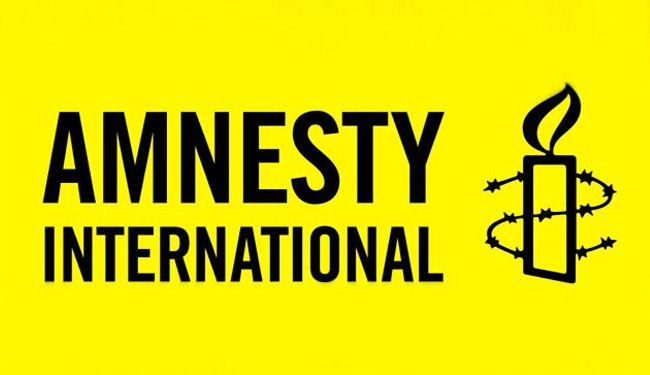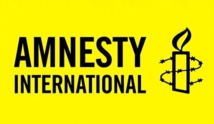It slammed the "horrendous war crimes and other abuses in the city by government forces and armed opposition groups on a daily basis".
"Some of the government's actions in Aleppo amount to crimes against humanity," Amnesty said.
The report was particularly critical of the government's use of so-called barrel bombs, crudely constructed weapons fashioned from barrels and other vessels packed with explosives.
Rights groups say the weapons are especially destructive and kill indiscriminately.
"By relentlessly and deliberately targeting civilians the Syrian government appears to have adopted a callous policy of collective punishment against the civilian population of Aleppo," said Amnesty's Middle East and North Africa programme director Philip Luther.
Despite documentation of the government's use of the weapons by rights groups and activists on the ground, Syrian President Bashar al-Assad has repeatedly denied that his forces use barrel bombs.
Their use has created "sheer terror and unbearable suffering," said Amnesty.
On Monday, the Doctors Without Borders NGO said one of the main hospitals in Aleppo had been forced to suspend activities after recent attacks.
The hospital in rebel-held Sakhur served some 400,000 people, the group said, renewing an appeal for all sides "to respect civilians, health facilities and medical staff."
The Amnesty report also criticised rebels fighting in Aleppo, which has been divided between government control in the west and opposition control in the east since shortly mid-2012.
The report said rebels were committing "war crimes" by using "imprecise weapons such as mortars and improvised rockets fitted with gas canisters called 'hell cannons.'"
Rebels regularly fire missiles into western Aleppo, with Amnesty saying some 600 civilians had been killed in such attacks in 2014.
Regime barrel bomb attacks killed more than 3,000 civilians across Aleppo province last year, Amnesty said.
The report also documented "widespread torture, arbitrary detention and abduction by both government forces and armed opposition groups."
And it slammed the international community for failing to punish abuses against civilians in Syria, calling it a "cold-hearted display of indifference" that encouraged impunity.
"Continued inaction is being interpreted by perpetrators of war crimes and crimes against humanity as a sign they can continue to hold the civilians of Aleppo hostage without fear of any retribution," said Luther.
The Syrian conflict should be referred to the International Criminal Court so perpetrators "can be brought to justice", he said.
More than 220,000 people have been killed in Syria since March 2011, according to the Syrian Observatory for Human Rights monitor.
The country's conflict began with anti-government protests, but spiralled into a bloody war after a regime crackdown.
-----------------------------------------------------------------------------------------------------------------------
"Some of the government's actions in Aleppo amount to crimes against humanity," Amnesty said.
The report was particularly critical of the government's use of so-called barrel bombs, crudely constructed weapons fashioned from barrels and other vessels packed with explosives.
Rights groups say the weapons are especially destructive and kill indiscriminately.
"By relentlessly and deliberately targeting civilians the Syrian government appears to have adopted a callous policy of collective punishment against the civilian population of Aleppo," said Amnesty's Middle East and North Africa programme director Philip Luther.
Despite documentation of the government's use of the weapons by rights groups and activists on the ground, Syrian President Bashar al-Assad has repeatedly denied that his forces use barrel bombs.
Their use has created "sheer terror and unbearable suffering," said Amnesty.
On Monday, the Doctors Without Borders NGO said one of the main hospitals in Aleppo had been forced to suspend activities after recent attacks.
The hospital in rebel-held Sakhur served some 400,000 people, the group said, renewing an appeal for all sides "to respect civilians, health facilities and medical staff."
The Amnesty report also criticised rebels fighting in Aleppo, which has been divided between government control in the west and opposition control in the east since shortly mid-2012.
The report said rebels were committing "war crimes" by using "imprecise weapons such as mortars and improvised rockets fitted with gas canisters called 'hell cannons.'"
Rebels regularly fire missiles into western Aleppo, with Amnesty saying some 600 civilians had been killed in such attacks in 2014.
Regime barrel bomb attacks killed more than 3,000 civilians across Aleppo province last year, Amnesty said.
The report also documented "widespread torture, arbitrary detention and abduction by both government forces and armed opposition groups."
And it slammed the international community for failing to punish abuses against civilians in Syria, calling it a "cold-hearted display of indifference" that encouraged impunity.
"Continued inaction is being interpreted by perpetrators of war crimes and crimes against humanity as a sign they can continue to hold the civilians of Aleppo hostage without fear of any retribution," said Luther.
The Syrian conflict should be referred to the International Criminal Court so perpetrators "can be brought to justice", he said.
More than 220,000 people have been killed in Syria since March 2011, according to the Syrian Observatory for Human Rights monitor.
The country's conflict began with anti-government protests, but spiralled into a bloody war after a regime crackdown.
-----------------------------------------------------------------------------------------------------------------------









 Home
Home Politics
Politics











